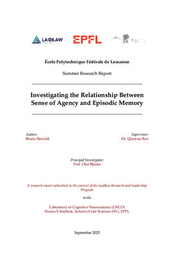Struggling to remember past events? Take Control.
Why are some past experiences vividly remembered while others fade? This research examines how the sense of agency, the feeling of controlling one’s actions and their effects, relates to episodic memory, the ability to recall personal experiences in detail. My role was to implement an online experimental application to test this. While factors like sensory richness are known to influence memory, the role of the sense of agency remains unclear. We hypothesise that greater agency strengthens the link between actions and bodily self-consciousness, the sense of being the agent of perception and movement. This makes events feel more self-relevant and therefore more memorable. In the first part of the experiment, participants are asked to move objects using a keyboard. Sometimes the object movements match the participant’s input, and sometimes they do not. After each trial, the participant is asked to rate the feeling of agency they have over the object’s movement. Later, they are asked to recall whether they saw the image before and its final direction. An online version made the experiment accessible to a broader audience. I contributed to the experimental protocol by adding confidence questions after each recognition trial. Previous research in my laboratory found an effect on memory for object position, but not for the objects themselves. Confidence questions may help capture other aspects of this difference. Although data collection with this feature is ongoing, we expect higher agency may also influence object recognition. Such findings would advance our understanding of self-consciousness and pave the way for non-invasive treatments for memory and agency deficits in conditions like Alzheimer’s and schizophrenia.

Please sign in
If you are a registered user on Laidlaw Scholars Network, please sign in